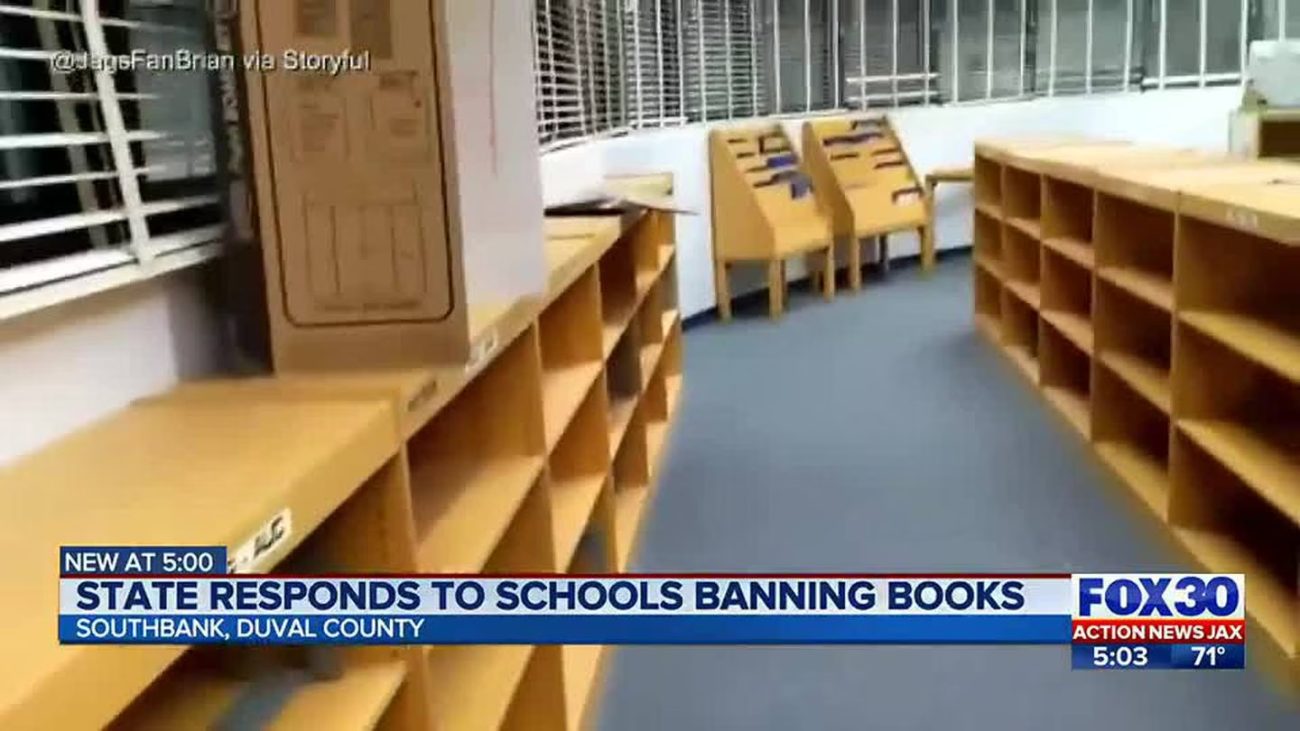Florida Commissioner of Education addresses inconsistent implementation of new curriculum laws
Action News Jax | By Jake Stofan | February 13, 2023
JACKSONVILLE, Fla. — New state laws restricting certain kinds of curriculum and requiring greater transparency have led to images of empty school libraries here in Duval County and across Florida grabbing national headlines.
There have also been numerous stories suggesting teachers could face felony charges for violating new curriculum restrictions.
“It’s clear that props have been used on occasion and for a political agenda,” Florida Commissioner of Education Manny Diaz said.
In an exclusive interview with Action News Jax, Diaz argued many narratives have been overblown.
“I think some of this with the empty bookshelves and all that is staged,” Diaz said.
He also noted the threat of a felony for distributing harmful content to minors is a statute specific to porn that has been on the books for decades.
That statute is separate from new curriculum laws dealing with the teaching of race, sexual orientation and gender identity.
“To conflate the two statutes and scare teachers that they’re going to be charged with a third-degree felony is preposterous,” Diaz said.
But there are some areas where Diaz agrees there seems to be genuine confusion.
For instance, some school districts like Clay and St. Johns pull books immediately upon being challenged.
In Clay County, public records show of 52 book challenges filed between January 1, 2020 and September 22nd, 2022 , more than half came from a single individual and just five people made up 90 percent of the challenges.
“We cannot let these lone voices represent all parents,” Stephana Ferrell, with the Florida Freedom to Read Project, said.
Ferrell said with challenges taking months to vet, activist groups are essentially able to ban books without proving their case, due to the district erring on the side of caution.
“It actually goes against Clay’s own policy that says we need to be careful to not let one viewpoint, one person, one group control or censor our libraries. That’s exactly what’s happening,” Ferrell said.
Ferrell said in practice, a small number of parents are exercising outsized influence over everyone’s children.
“When it’s one person or one group that gets to have this excised right over the rest of us, it really is an infringement and then you do have to wonder, okay, they have parental rights, but I have parental rights too,” Ferrell said.
But Diaz said books should only be pulled pending review if content is obviously explicit or controversial.
“Let’s use common sense,” Diaz said. “Sure, is the system gonna be perfect? Are there gonna be those that may try to take advantage of it? But the process is there to protect the system and again, that’s why we have professionals at our schools who can take care of this and make sure that the right materials are in front of the right kids.”
Advocates like Ferrell argue parents should be in charge of their own child’s education, rather than everyone else’s.
She pointed out parents have the ability to place restrictions on what content their students are allowed to be exposed to at school.
In Clay County, a district of more than 30,000 students, public records show there were only three instances where parents exercised that right.
“So, when it comes to parental rights in education, the majority of parents say and trust their school library professionals,” Ferrell said.
Diaz countered that there are some materials that simply have no business in a school library or classroom, but he said there may be opportunities for state lawmakers or the department to help clarify exactly where districts should draw the line.
“That doesn’t excuse people to use it for political theater and to put teachers in a bad situation or deprive kids of books they should have access to, but of course you always want to improve your systems and processes so that they get better as you go along,” Diaz said.






